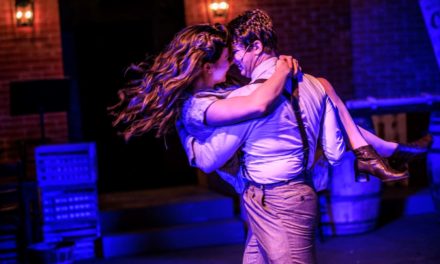PROVO — Have you ever seen a work of art, face to face, that is nearly 3,000 years old? That’s what seeing a live production of Oedipus Rex is like—only in this case, it feels fresh and vibrant. Not at all like the faded relic you might expect locked behind museum glass.
Just over a year ago, Graham Ward was doing scene work for an acting competition. He found himself drawn to the timeless drama of Oedipus, and in particular, the scene where the blind prophet Tiresias speaks truth to power in the presence of the king. But one thing troubled Ward; he realized that much of the language used was archaic and stilted. “It would instantly pull you out of the moment as an audience member. You hear it and can’t help but realize that you’re watching a play,” Ward said of the language.
He began looking at other translations of the text to get at the root of what was being said, and perhaps more importantly, the different ways of saying it. This led him to the eventual creation of an entirely new adaptation of the play from a different perspective. Ward, who also directs this production said, “Most translations come from language scholars who are looking at the play purely from a linguistics standpoint. I wanted to approach the text from a performance angle.” says Ward.
Ward has built his adaptation by drawing from at least eight different translations of the play’s Ancient Greek text by Sophocles and has made the work his own through a variety of changes and additions. “I took a lot of the long speeches and broke them out into dialogue. I expanded on some things and tweaked others.” After a year of work on the script, and six weeks development in rehearsal, Graham Ward’s Oedipus opened last night in the Margett’s Theatre at Brigham Young University.
As the play begins, the intimate space at the Margetts is filled with the soaring harmonies of the Chorus: wailing to the gods in ritual prayer for deliverance from a deadly plague that has beset the city. Original music from composer David Jon Banks brought these choral passages to life, and skillful music direction from Sarah Porter ensured a tight ensemble. The vocalists sounded great and provided nice atmospheric touches throughout the play.
Next, we meet Oedipus the King, played by Darick Pead. We instantly like Oedipus and are convinced of his sincerity and commitment to do whatever it takes to save his people. Pead is an energetic and expressive actor who lends a good deal of pathos to the role. Another stand out performance comes from BYU alum Jeff Dickamore, who plays an affable and charismatic Creon. Dickamore has a real magnetism and emotional depth that is a delight to watch.
It’s not long before Oedipus crosses paths with the blind seer Tiresias, played here by David Morgan. Tiresias carries the burden of many secrets, and Morgan, thankfully has more than enough gravitas to pull this off. His attention to detail as an actor is utterly engaging. He delivers every motivated moment with masterful clarity.
Oedipus wife (and mother) Jocasta is played by the talented Stephanie Breinholt. The actress playing Jocasta has the difficult job of convincing us that she can love Oedipus as both a husband and a son; the wide range of complex emotions Breinholt expresses in the role are proof that she is up to the challenge. Breinholt’s Jocasta is both powerful and furtive; she has a transparent urgency that drives her performance in every scene.
As the revelations mount and the awful inevitability comes to light, we’re left aching for these very human characters of mythic proportions. Ward’s adaptation explores many familial moments in the story that I’ve never encountered like this before. Of note are the scenes between Creon and Oedipus: Ward’s writing and direction, combined with the wonderful chemistry between actors Pead and Dickmore are deeply moving. The scene where Oedipus begs to see his daughters is just one of those scenes where everything works together wonderfully. Several audience members began quietly weeping at the pitiful sight of the father’s final requests.
The production is not without it’s faults, and there are certainly opportunities for improvement and tightening, but overall, it’s an extraordinary accomplishment and a good evening of theatre. If I had any complaint, it would be that I missed some of the dialogue. I’m not sure if this was due to shortcomings in terms of diction or projection, or possibly the delightfully quick pace at which things move, but I did miss some of the words. Which is a shame, because I wanted to catch everything.
The writing itself turns out to be both accessible and poetic without ever feeling pedestrian. It’s grounded without being casual. The epic nature of the stakes and colossal power of the characters are always there. It should also noted that this is a play about ideas—not about production values. The costumes, set, and lighting are spare, but intentionally so. The minimalism of the production is highlighted by it’s color scheme: Black. Nearly everything is black. The theatre is black, the single set piece is black, the costumes and props are black, and even the blood is black. This allows the audience to focus on the interactions between the characters and the depth of what’s being said.
Even though the designs are minimal, the subtle suggestions of the play’s Greek roots are a nice touch. The characters wear modern clothing with togas on top; there are several masked characters; and the seating of the Margetts has been arranged to approximate a Greek amphitheatre thrust (albeit on a much smaller scale). This seating arrangement promoted an endearing closeness between actors and audience. At several points, the actors directly address the audience and treat them as though they are citizens of Thebes.
And it’s moments like these, that I would stop and think, “How many times, and in how many centuries has Oedipus turned to the crowd, seeking support? How many times has he railed against fate, and how many times have we felt for him as he falls to the depths of despair?” This is why we go to the theatre. To think, and to feel. To experience old things in new ways. To gather together. Oedipus at the Margetts accomplishes all of the above.





